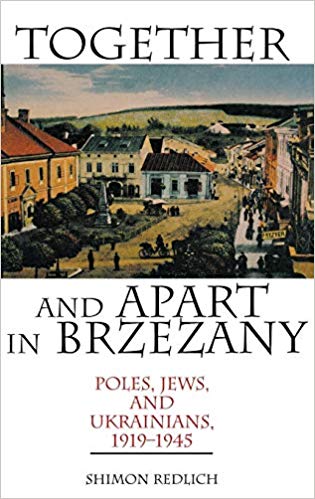Censorship By Jewish Peer Pressure SMOKING GUN Redlich

Together and Apart in Brzezany, by Shimon Redlich. 2002
Jewish Peer Pressure Enforces Polonophobia. Jewish Disloyalty to Poland in the 1939 German-Soviet Conquest of Poland
Brzezany, in the former Kresy, located 80 km SE of Lwow and founded by a Pole (p. 5), was the home of Rydz-Smigly. (p. 22, 27, 29, 50). It was once visited by US President Herbert Hoover (p. 27), a Polonophile.
Very few Brzezany Jews survived the Holocaust, and the onetime Brzezany Jews interviewed by Redlich, most living in Israel, were largely prewar emigrants. Most Brzezany Poles interviewed consisted of expellees who now live at Ustron in Silesia. (p. 25). A few Poles still live in Brzezany (p. 12, 26, 154), and one interviewed Brzezany Pole is an American emigre. The Ukrainians interviewed consisted of an assortment of émigré Ukrainians and locals. However, most current “Brzezanians” are postwar-resettled eastern Ukrainians. (pp. 3-4, 147).
JEWISH PEER PRESSURE FOR JEWS TO BE NEGATIVE ABOUT POLAND
Do Polonophobic Jews influence Jews that are not anti-Polish? Definitely. This is now confirmed in print. Redlich interviewed Jewish sisters Rena Wanderer-Stolarsky and Ruth Wanderer-Biheller, both of whom had survived the Holocaust thanks to being hidden by a series of successive Poles. Both sisters expressed hatred of Poles, and: “Rena advised me not to present the Poles in too favorable a way `for the sake of our martyrs’. Still, during lunch in Ruth’s suburban New Jersey house, she remarked, `I wonder what we would have done as potential rescuers.’ We didn’t follow up on this touchy subject.” (p. 22, 169). Good question, and nice dodge.
JEWISH DISLOYALTY TO POLAND IN 1939
Froyko Schmidt of Israel recounted how those who greeted the Soviet tanks at Brzezany in 1939 were mostly Jews. (p. 88). Vasyl Fanga acknowledged widespread Ukrainian-Nazi collaboration, and faulted Ukrainians for naively believing that Hitler would create an independent Ukraine. (p. 115).
POLISH ANTISEMITISM EXAGGERATED
The awfulization of the Jewish and Ukrainian experiences under Polish rule (1918-1939) is strongly rejected by Redlich. Among the spectrum of Ukrainian opinions are some Ukrainians who remember generally positive Polish-Ukrainian relations. (p. 65). She also comments: “If there was anti-Semitism in interwar Brzezany, it usually assumed quite mild forms.” (p. 67; see also p. 70). Also: “Although `Polishness’ was a dominant feature, Jews and Ukrainians weren’t completely alienated.” (p. 164). For instance, Ukrainians enjoyed considerable cultural autonomy (p. 54), and some Jews and Ukrainians participated in events commemorating May 3, Nov. 11, etc. (p. 47).
THE “UKRAINIANS HAD IT BAD IN POLAND” MYTH
The separatist OUN murdered not only Poles but also Ukrainians who merely criticized them. (p. 41, 69). The prewar Polish government eventually closed the local Proswita and abolished the Ukrainian Scouts (Plast) for the unmentioned reason that they had become hives of sedition. The government, well aware of the fact that the extremist OUN wanted to provoke a Polish crackdown that could only antagonize Ukrainian moderates, had long delayed its actions. Consider Vasyl Fanga, a former UPA member who still lives in Brzezany: “Vasyl admitted, however, that Polish anti-Ukrainian acts were child’s play compared to what would happen later under the Soviets.” (p. 69).
UKRAINIANS TRY TO BLAME THE POLES
Redlich touches on the OUN-UPA genocide of Poles, the AK’s use of the Bernardine Cloister and the Farny Church at Brzezany as samoobrony (defense points), Operation Burza (Tempest)(p. 111, 130), and the later Soviet-formed Polish STREBKI. (Battalions of Destruction)(pp. 145-147). She repeats the Poles-started-it-at-Kholm (Chelm) myth. (pp. 101-102, 131). In actuality, Polish attacks on Ukrainian (and German) settlements there had been a reaction against the systematic German-sponsored forced replacement of Poles with Germans and Ukrainian collaborators.
THE PAST AND THE PRESENT
Various groups of Jews, Poles, and Ukrainians visited eastern Galicia, in recent years, after decades of absence. They remarked that Lwow and Brzezany looked dilapidated and sad compared to their state under Polish rule. (p.11, 161).
To see a series of truncated reviews in a Category click on that Category:
- All reviews
- Anti-Christian Tendencies
- Anti-Polish Trends
- Censorship on Poles and Jews
- Communization of Poland
- Cultural Marxism
- German Guilt Dilution
- Holocaust Industry
- Interwar Polish-Jewish Relations
- Jewish Collaboration
- Jewish Economic Dominance
- Jews Antagonize Poland
- Jews Not Faultless
- Jews' Holocaust Dominates
- Jews' Holocaust Non-Special
- Nazi Crimes and Communist Crimes Were Equal
- Opinion-Forming Anti-Polonism
- Pogrom Mongering
- Poland in World War II
- Polish Jew-Rescue Ingratitude
- Polish Nationalism
- Polish Non-Complicity
- Polish-Ukrainian Relations
- Polokaust
- Premodern Poland
- Recent Polish-Jewish Relations
- The Decadent West
- The Jew as Other
- Understanding Nazi Germany
- Why Jews a "Problem"
- Zydokomuna